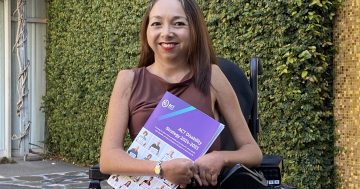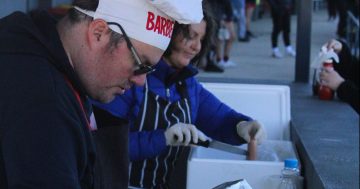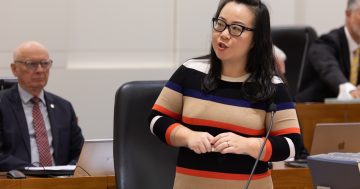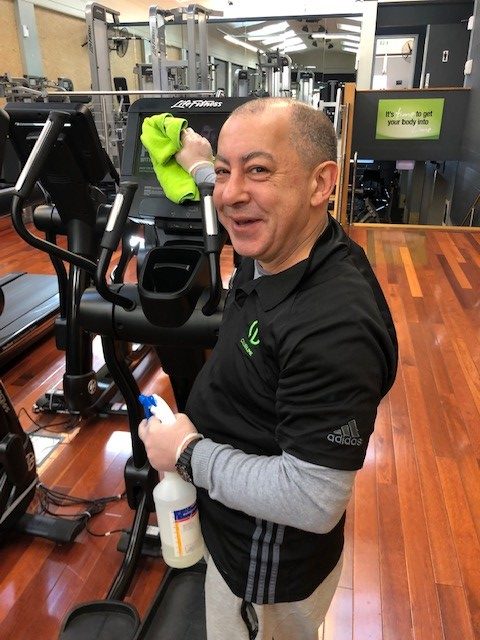
Stacy at Club Lime. Photos: Supplied.
It isn’t all muscle pumping, primping, health or fitness at Club Lime Kingston. It’s also about diversity and boosting morale.
Among the many notable achievements Club Lime is recognised for is their inclusivity, hiring people with different abilities and disabilities to join their growing team.
One staff member, Stacy Pantelidis, has a disability, and loves working at Club Lime. “Everyone is very happy and that makes me satisfied,” says Stacy.
Stacy enjoys being able to copy the member scan-ins into the system. He also likes the treadmill, and at the end of his shift, he uses it to get in shape.
Stacy’s supervisor and Club Lime Leader for Kingston, Jordan Kelly, says that he and Stacy get along well and have a few laughs together at work, and that he appreciates Stacy’s good sense of humour.
“I’ve formed a great relationship with Stacy, and we have great respect for each other,” Jordan says. “He has a great personality and I know I can trust him to do the tasks required. He also has a good relationship with other members of staff and club members.”
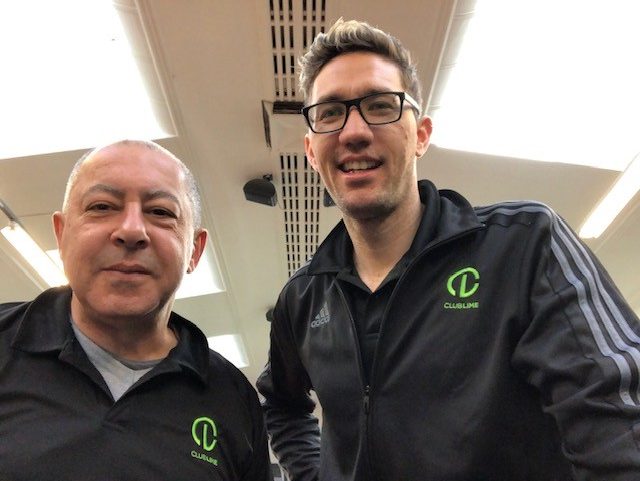
Besides the treadmill, Stacy says his favourite activity at Club Lime is hanging with Jordan.
“Employing people with a disability benefits not only the employee but the employer,” Jordan says. “I get to see things from a different perspective, and it acts as a learning curve for people skills, management and procedures within the workplace.
“For the employee, it benefits their mental state, as it acts as a vessel for learning, and gives a sense of inclusion and purpose.”
Club Lime owner Viva Leisure Limited, which is headquartered in Mitchell and manages a range of gyms across Canberra, has been working with disability employment service providers for a while.
“We have partnered with disability employment service providers to engage talented staff to work across our aquatics operations, customer service teams and cleaning of our facilities,” HR Manager Jodie Sims says. “These are important roles ensuring the safety and an excellent experience for our members.
“We have great diversity of capability represented across our workforce, and value the inclusion of people who may be managing (or recovering from) mental health conditions, or have a physical disability.”
Ms Sims says the company aims to create a community atmosphere within its clubs, “so it’s important that our workforce is representative of the communities we work within”.
Club Lime has found it possible to effectively integrate staff into different roles.
“No one should be hindered by their disability; they should be nurtured to help them grow and bring out the best of what they can physically or mentally offer and having someone with a disability as an employee can help bring out the best in them,” Ms Sims says.
And there are always ways to adapt the working environment to accommodate people with particular needs.
“We do have the example of a busy reception desk, where the space available and height of the counter has not provided good wheelchair accessibility, and this may be something we need to review in future, to consider possible modifications for improved access,” Ms Sims says.
Only half of people with a disability (aged 15-64) are employed, compared to 82.4 per cent of the wider population. In Canberra, 62,000 people live with disability. The private sector is the largest employer of people with disabilities in Canberra, (11,100), followed by government (8,800).
So why aren’t more organisations employing people with disabilities? Or modifying their environment? According to the latest research, barriers include: a lack of information, lack of understanding about different disability types and work restrictions and supports, perceived legal risks, cost and time.
Ms Sims’ message to any other business or government looking to hire someone with a disability is to give them a go.
“Get to know the person and form a respectful relationship. People with disabilities are willing to work hard within their restrictions. Form a bond, give them respect and in turn they show that respect and passion to want to succeed. It builds their confidence,” she says.
According to a spokesperson for the Department of Social Services, more than $3 billion is allocated over the next four years in disability employment and other services, including for work-related equipment and modifications. Wage subsidies are also available.
To find out more, employers should visit jobaccess.gov.au or phone 1800 464 800. To fund practical inclusion projects, businesses can apply online for an ACT disability inclusion grant. Employers can reach out for peer support through Inclusion in Employment, headed by Cam Sullings of the Canberra Business Chamber.
Do you or someone you know have a disability? Membership with People with Disabilities ACT is free – Join today and help build a stronger collective voice in Canberra.












